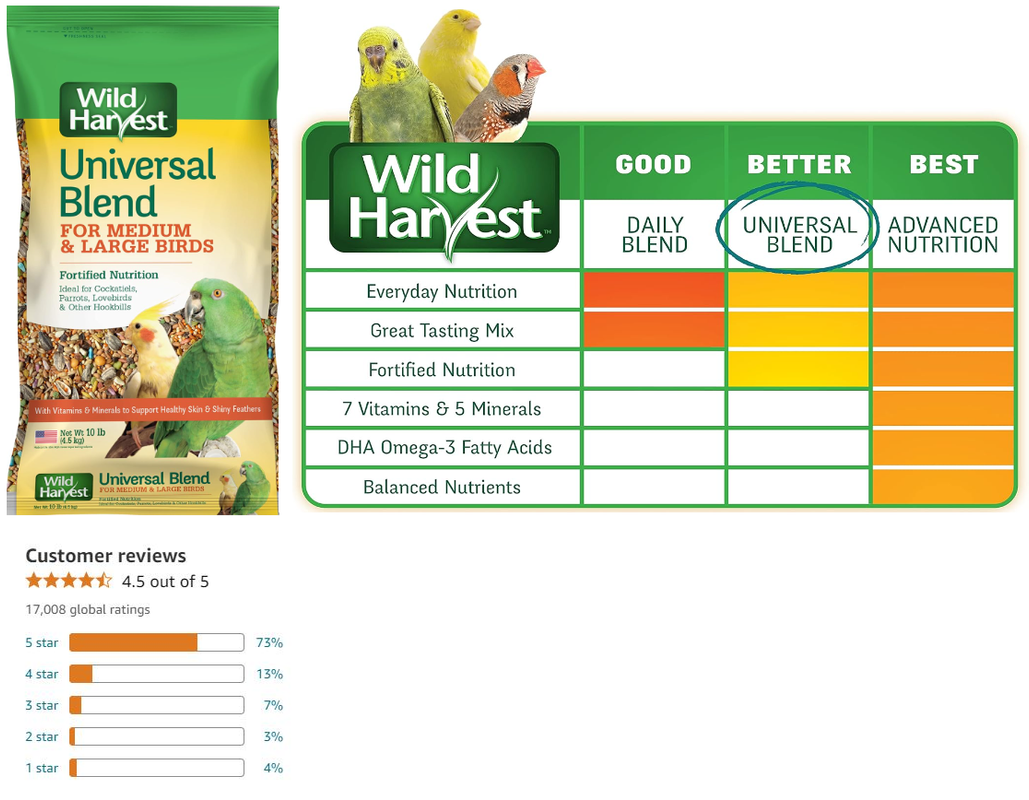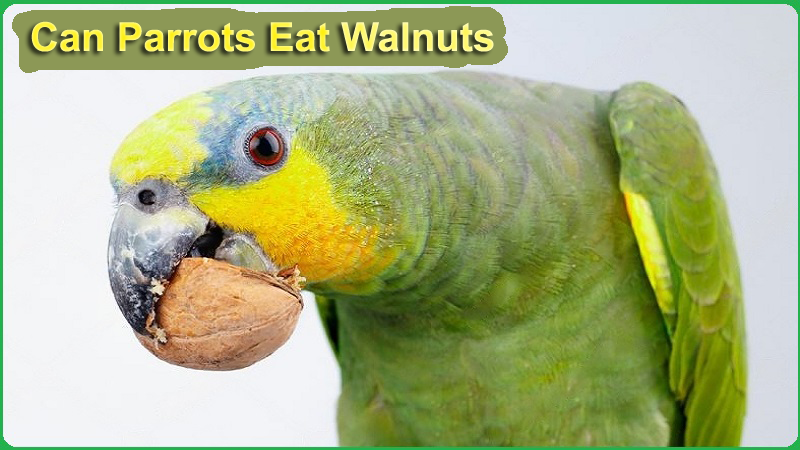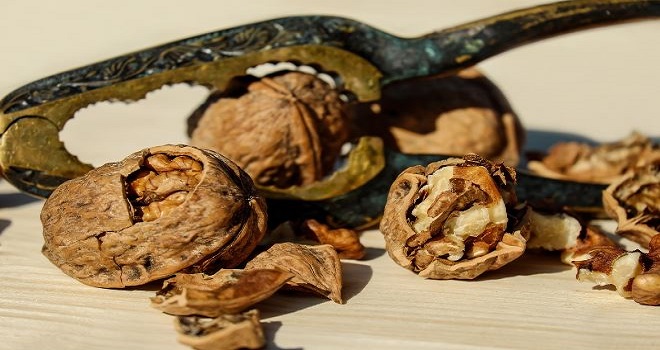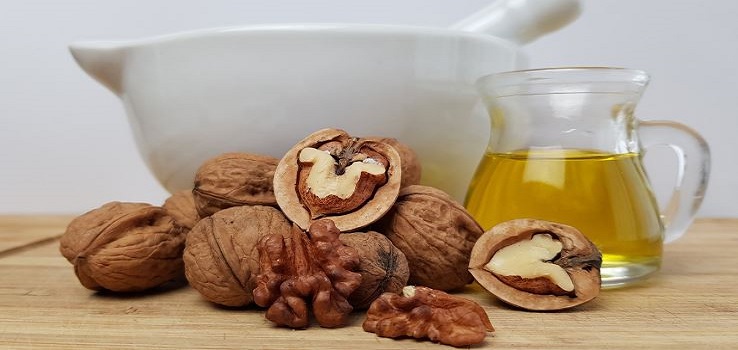If you are parrot owner, then you already know about they like to love with taste all of your food. But, parrots haven’t sense whether this food is harmful or beneficial for them. So, they always try everything with carelessly, and unusual food makes them very curious. If you like to eat walnuts, and they are in your kitchen; you should be known regarding they are safe for your parrot or not to eat. So, can parrots eat walnuts?
The answer in short, Yes! Parrots can prefer to eat walnuts because they are completely safe for your pet birds. They are packed various substances that are beneficial for your pet birds. But, ensure walnuts are high quality and fresh.
What are walnuts item? How many walnuts can your parrot have? Therefore, in this unique post, we will cover all possible details about them. Getting more information stay with us!
Are Walnuts Good for Parrots?
Yes! Walnuts can be safe food for parrots to eat, if given in moderation and prepared properly. They have lot of valuable nutrients such as omega-3 fatty acids, protein, vitamins (like E and B6), and minerals. Although, should be offering only raw and unsalted walnuts, because roasted or flavored items may consist additives dangerous to parrots.
Offer walnuts as an occasional treat, with small to medium-sized parrots grabbing 1-2 small pieces per week and larger parrots up to 3-4 pieces; helps to prevent over-consumption of their high-fat content. Always walnuts should be fresh and free from mold, because mold can arise toxins like aflatoxins.

Feeding walnuts with breaking into small, manageable pieces decreases the choking issues. Closely monitoring your parrot for any signs of digestive issues or allergic reactions when you introducing walnuts.
Walnuts Health Benefits for Parrots
Walnuts don’t come only a tasty treat but also a nutrient-dense item that provide numerous health benefits to parrots.
Also Read: Can Parrots Eat Raisins? Toxic or Safe
Omega-3 Fatty Acids
Walnuts are packed of omega-3 fatty acids in high amount that help to maintain cardiovascular health in your parrots.
Omega-3s is helping out the reduce level of inflammation, and support to brain function, healthy skin and feathers.
High in Protein
Walnuts are in enough protein that helps to muscle development, feather growth, and tissue repair.
Packed with Vitamins
Walnuts have tons of vitamin E, an antioxidant that helps protect cells from damage caused by free radicals, and supports to immune function and promotes healthy skin and feathers.
B6 vitamins are also rich in walnuts that are important for brain health and the formation of neurotransmitters.
Energy metabolism, and maintain their activity levels.
Abundant in Minerals
Magnesium helps to numerous biochemical reactions in the body, including energy production and muscle function.
Phosphorus helps to work with calcium to build strong bones and teeth.
Manganese plays a role in bone formation, metabolism, and the antioxidant defense system.
Antioxidant Properties
Walnuts have several antioxidants, like as polyphenols that help combat oxidative stress.
Nutritional Value of Walnuts for Parrots
Here, we will show you a table summarizing the nutritional value of walnuts for parrots:
Also Read: Can Parrots Eat Cinnamon? Dietary Do’s and Don’t
| Nutrient | Amount Per 1 oz (28g) of Walnuts |
|---|---|
| Calories | 185 |
| Protein | 4.3g |
| Fat | 18.5g |
| Omega-3 Fatty Acids | 2.5g |
| Omega-6 Fatty Acids | 10.7g |
| Fiber | 1.9g |
| Magnesium | 45mg |
| Phosphorus | 98mg |
| Potassium | 125mg |
| Calcium | 28mg |
| Iron | 0.8mg |
Harmful Effects of Walnuts If Eat Everyday Too Much
While walnuts can be a nutritious addition to a parrot’s diet, over-consumption can lead to several health issues. Here are some potential harmful effects of feeding too many walnuts to parrots:
Obesity
Due to high fat content, walnuts are calorie-dense. Overfeeding walnuts can lead to an excess of calories, result weight gain and obesity in parrots.
Nutritional Imbalance
If walnuts are fed in large quantities, they can displace other essential foods in a parrot’s diet, leading to nutritional imbalances.
A diet too rich in walnuts can lack essential vitamins and minerals found in other fruits, vegetables, and pellets necessary for a parrot’s overall health.
Digestive Issues
The high fat content in walnuts can be difficult for a parrot’s digestive system to handle, and leading to gastrointestinal upset.
Aflatoxin Contamination
Like other nuts, walnuts can be susceptible to mold contamination, which produces aflatoxins. Due to aflatoxin poisoning can get liver damage, and immune suppression.
Liver Disease
Over-consumption of walnuts can lead to fatty liver disease (hepatic lipidosis) in parrots.
Choking Hazard
Whole or large pieces of walnuts can pose a choking hazard, especially for smaller parrot species.
Allergic Reactions
Although rare, some parrots may be allergic to nuts, including walnuts.
If an allergic reaction is suspected, discontinue feeding walnuts immediately. Consult an avian veterinarian.
Types of Walnuts
Here are the different types of walnuts commonly available:
Also Read: Can Parrots Eat Pistachio Nuts? Health Benefits and Risks
English (Persian) Walnuts
- Most of common variety are available in grocery stores
- Mild flavor and thin shells
- Can be using in baking, cooking, and as a snack
Black Walnuts
- Strong, bold flavor with a hint of earthiness
- Harder shell compared to English walnuts.
- Often using in desserts and specialty recipes
White Walnuts (Butternuts)
- Milder and sweeter taste
- Light-colored shells and kernels
- Less common and often found in specialty markets
Red Walnuts
- Naturally occurring hybrid with a red skin
- Similar flavor to English walnuts but with a slightly sweeter taste
- Often used for their unique color in culinary dishes
Heartnuts
- A type of Japanese walnut
- Heart-shaped and has a sweet, mild flavor
- Thinner shell, making them easier to crack open
How Much Walnut Should You Feed Your Parrot?
When you feed walnuts to your parrot, then moderation is key. Offer walnuts as an occasional treat besides of a staple in their diet.
For small to medium-sized parrots, you can offer 1-2 small pieces of walnut per week is sufficient.
For larger sized parrots can have up to three to four small pieces per week.
Keep remember, walnuts are fresh, free from mold, and broken into manageable pieces to prevent choke.
Can Parrots Have Walnut Oil?
The answer is, yes! Parrots can have walnut oil, but given in moderation. Walnut oil has tons beneficial omega-3 fatty acids that help to support cardiovascular and brain health.
Due to high fat and calories, so only a few drops should be mixed to their food occasionally. Oil should be pure, cold-pressed, and free from additives.
As with any dietary addition, always observe your parrot for any worst reactions. Consult with an avian veterinarian to ensure it fits well within their balanced diet.
Walnut oil can be a healthy supplement but should not replace other essential nutrients.
Are Walnut Shells Safe for Parrots?
Walnut shell can be hazardous for your pet parrots. The hard, sharp edges of walnut shells pose a choking and impaction risk to parrots.
Also Read: Can Parrots Eat Cucumber? Answers for Parrot Owners
Whole walnuts in the shell can provide enrichment by allowing parrots to chew and play. The shells themselves should never be fed to parrots.
Always stick to providing plain, unsalted walnut halves as an occasional treat. Making sure they are fully consumed without any shell fragments remaining. Consult an avian vet if you have concerns about your parrot’s diet or safety.
Can Parrots Eat Walnuts Seed?
Never! Parrots should not eat walnut seeds or the shells enclosing them. Walnut shells are hard and can lead a choking hazard or cause digestive issues if ingested.
As well as, walnut seeds (the part inside the shell) are not suitable for parrots, because they contain toxins and can be difficult to digest.
Just offer the edible part of the walnut—the kernel—after removing the shell and breaking it into small, safe pieces.
Can I Give Roasted Walnuts to Parrots?
Again answer is ‘NO’! Roasted walnuts should not offer to parrots. Roasting can eliminate some of the beneficial nutrients in walnuts and may add unhealthy fats or salt.
Roasted walnuts can be harder for parrots to digest as compared to raw ones. Instead, offer raw, unsalted walnuts in moderation, ensuring they are fresh and free from mold. Break them into small pieces to prevent choking.
Feeding Tips Walnuts to Parrots
Feeding walnuts to your parrot can be beneficial if done correctly. Here are some tips to ensure they are fed safely and healthily:
Moderation
Offer walnuts as an occasional treat, not a staple. Small to medium-sized parrots: 1-2 small pieces per week. Larger parrots: up to 3-4 small pieces weekly.
Preparation
Choose raw, unsalted walnuts.
Break into small, manageable pieces to avoid choking hazards.
Freshness: Ensure walnuts are fresh and free from mold.
Dietary Balance: Incorporate walnuts into a balanced diet with pellets, fresh fruits, vegetables, and other nuts and seeds.
Observation: Monitor for any adverse reactions when introducing walnuts.
Hygiene: Wash walnuts thoroughly to remove pesticides or contaminants.
Enrichment: Use walnuts in foraging toys to stimulate natural foraging behavior.
Veterinary Advice: Consult an avian veterinarian before making significant dietary changes, including introducing walnuts.
Conclusion
As result of this article, walnuts are safe for your parrots in many ways, like as from giving their feathers with healthy fats to proving them tons important nutrients.
Also Read: Can Parrots Eat Blueberries? What You Need to Know
Giving walnuts to a parrot, you should be aware of the risks of choking and possible allergies.
Like as pet parents, we must be careful when preparing walnuts for our parrots to ensure they are fresh.
Do you have any experience, tips, tricks, or query regarding on this? You can drop a comment!
Have a Nice Day!!






